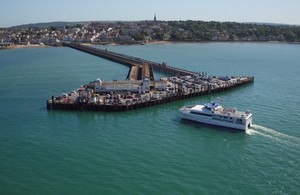International safety rules for High Speed Craft brought into force
International rules on safety levels for High Speed Craft (HSC) are being brought into force under UK law.

FastCat – a fast ferry operated by Wightlink – approaching Ryde Pier Head Port on the Isle of Wight. Photo credit: Wightlink.
The regulations bring three main changes - additional safety drills and record keeping, opening-up the satellite providers’ market which should reduce costs and introducing an automatic update to any future changes internationally covering HSC.
Vessels covered include such craft as fast ferries and catamaran.
It brings into force the latest changes to the international HSC Codes, which operate under Chapter X (Ten) of the International Convention for the Safety of Life at Sea 1974 (SOLAS).
The new safety standards will require enclosed space entry and rescue drills to be carried out and recorded that they have been done. This is in addition to other drills already legally required such as fire and evacuation ones.
For operators, the opening-up of the Global Maritime Distress and Safety System (GMDSS) satellite providers’ market, should reduce costs in the longer term.
The final change is to bring in what is known as ambulatory referencing meaning any future amendments to the HSC Codes will be automatically updated in UK law.
Katy Ware, Director of UK Maritime Services, said: “We are committed to making sure every maritime craft and vessel has the right level of safety and it’s important for these rules to be brought into UK law.
“It’s also important that we’ve brought in rules that will automatically update UK law, so that we will always be current with the Codes, whatever changes are made.”
For further information and a chance to provide your views, please see the The Merchant Shipping (High Speed Craft) Regulations 2022 consultation.